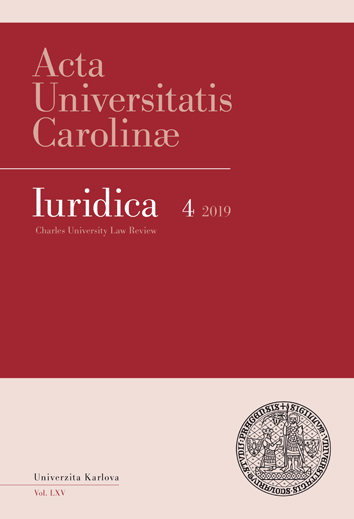K roli abdukce v právním myšlení aneb jak poznatky o abdukci mohou zvýšit pro-systémovost interpretace a aplikace práva
On Abduction in Legal Thinking or How Knowledge of Abduction Can Increase Pro-systemic Legal Interpretation and Application
Author(s): Katarzyna Žák KrzyžankováSubject(s): Philosophy of Law
Published by: Univerzita Karlova v Praze, Nakladatelství Karolinum
Keywords: abduction; inference to the best explanation; Ch. S. Peirce; G. Harman; criteria for choosing the best explanation; systematism; legal decision making
Summary/Abstract: The paper deals with the issue of abduction. First of all, the paper presents the development of the concept of abduction in the work of Charles S. Peirce, who was the first in modern history to examine abduction and suggested its two partially different concepts; namely abduction as one of the basic types of logical inferences, and – later – as a necessary stage in any process of creating new hypotheses or theories explaining a certain phenomenon, where abduction allows to generate explanatory hypotheses and to choose from possible explanations that appear to be the most appropriate in the given case. The catalogue of criteria that, according to Peirce and his followers, make it easier to select the best explanatory hypothesis is also presented. Attention is paid to Peirce’s consideration about the nature of human abduction reasoning. The analysis is supplemented by introduction of two basic directions in contemporary research in this field. In the second part, the paper identifies the basic types of cases which we encounter with abductive reasoning in legal thinking. Particular attention is paid to its use in practical thinking, namely situations where abduction reasoning contributes to finding a causal explanation of a certain legal-relevant phenomenon, to a legal assessment of the facts and to the formulation of an interpretative conclusion of an unclear provision. It is considered how the criteria determining the selection of the explanatory hypothesis, as well as knowledge of abduction itself, can contribute to pro-systemic legal interpretation and application, thus helping to reduce irrationality and arbitrariness of these processes. In examining this issue, one of the main problems of contemporary legal science and practice is identified, namely the absence of sufficient interpretative rules regulating conflicts between interpretative conclusions obtained on the basis of various interpretative methods.
Journal: Acta Universitatis Carolinae Iuridica
- Issue Year: 65/2019
- Issue No: 4
- Page Range: 69-88
- Page Count: 20
- Language: Czech

